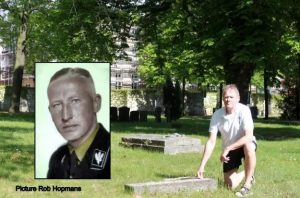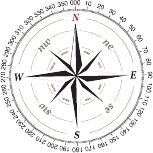Hácha, Emil Dominik Josef, born 12-07-1872 in Trové Sviny,  shortly after the outbreak of the World War I, he became a judge at the Supreme Administrative Court in Vienna. After the Treaty of Versailles, Pantůček became President of the Supreme Administrative Court of the Republic of Czechoslovakia in Prague, and Hácha became a judge (1918) and Deputy President (1919) of the court. After the Treaty of Munich and emigration of president Edvard Benes,
shortly after the outbreak of the World War I, he became a judge at the Supreme Administrative Court in Vienna. After the Treaty of Versailles, Pantůček became President of the Supreme Administrative Court of the Republic of Czechoslovakia in Prague, and Hácha became a judge (1918) and Deputy President (1919) of the court. After the Treaty of Munich and emigration of president Edvard Benes,  Benes died age 64, on 03-09-1948, , was chosen as his successor on 30-11-1938.
Benes died age 64, on 03-09-1948, , was chosen as his successor on 30-11-1938.
 shortly after the outbreak of the World War I, he became a judge at the Supreme Administrative Court in Vienna. After the Treaty of Versailles, Pantůček became President of the Supreme Administrative Court of the Republic of Czechoslovakia in Prague, and Hácha became a judge (1918) and Deputy President (1919) of the court. After the Treaty of Munich and emigration of president Edvard Benes,
shortly after the outbreak of the World War I, he became a judge at the Supreme Administrative Court in Vienna. After the Treaty of Versailles, Pantůček became President of the Supreme Administrative Court of the Republic of Czechoslovakia in Prague, and Hácha became a judge (1918) and Deputy President (1919) of the court. After the Treaty of Munich and emigration of president Edvard Benes,  Benes died age 64, on 03-09-1948, , was chosen as his successor on 30-11-1938.
Benes died age 64, on 03-09-1948, , was chosen as his successor on 30-11-1938.

In the evening of 14-03-1939, Hitler invited President Hácha to the Reich Chancellery in Berlin. Adolf Hitler (did you know) (see Hitler Paula)  deliberately kept him waiting for hours, an ordeal he referred to as “Háchaizing”. Finally, at 1:30 am on 15-03-1939, Hitler saw the President. He told Hácha that as they were speaking, the army was about to invade Czechoslovakia. Hitler (see Alois Hitler)
deliberately kept him waiting for hours, an ordeal he referred to as “Háchaizing”. Finally, at 1:30 am on 15-03-1939, Hitler saw the President. He told Hácha that as they were speaking, the army was about to invade Czechoslovakia. Hitler (see Alois Hitler)  now gave the President two options: to cooperate with Germany, in which case the “entry of German troops would take place in a tolerable manner” and permit Czechoslovakia a generous life of her own, autonomy and a degree of national freedom or face a scenario in which resistance would be broken by force of arms, using all means. By four o’clock, and after suffering a heart attack induced by Goering’s (see Goering-Sonnemann)
now gave the President two options: to cooperate with Germany, in which case the “entry of German troops would take place in a tolerable manner” and permit Czechoslovakia a generous life of her own, autonomy and a degree of national freedom or face a scenario in which resistance would be broken by force of arms, using all means. By four o’clock, and after suffering a heart attack induced by Goering’s (see Goering-Sonnemann)
 deliberately kept him waiting for hours, an ordeal he referred to as “Háchaizing”. Finally, at 1:30 am on 15-03-1939, Hitler saw the President. He told Hácha that as they were speaking, the army was about to invade Czechoslovakia. Hitler (see Alois Hitler)
deliberately kept him waiting for hours, an ordeal he referred to as “Háchaizing”. Finally, at 1:30 am on 15-03-1939, Hitler saw the President. He told Hácha that as they were speaking, the army was about to invade Czechoslovakia. Hitler (see Alois Hitler)  now gave the President two options: to cooperate with Germany, in which case the “entry of German troops would take place in a tolerable manner” and permit Czechoslovakia a generous life of her own, autonomy and a degree of national freedom or face a scenario in which resistance would be broken by force of arms, using all means. By four o’clock, and after suffering a heart attack induced by Goering’s (see Goering-Sonnemann)
now gave the President two options: to cooperate with Germany, in which case the “entry of German troops would take place in a tolerable manner” and permit Czechoslovakia a generous life of her own, autonomy and a degree of national freedom or face a scenario in which resistance would be broken by force of arms, using all means. By four o’clock, and after suffering a heart attack induced by Goering’s (see Goering-Sonnemann)
 (did you know) threat to bomb the capital, Hácha contacted Prague, effectively “signing Czechoslovakia away” to Germany French Ambassador Robert Coulondre, Coulodre died age 73, on 06-03-1959 in Paris, reported that by half past four, Hácha was, in a state of total collapse and kept going only by means of injections. After the occupation of the remnants of Czechoslovakia on 16-03-1939, he retained his office as President but was forced to swear an oath to Hitler and Konstantin von Neurath.
(did you know) threat to bomb the capital, Hácha contacted Prague, effectively “signing Czechoslovakia away” to Germany French Ambassador Robert Coulondre, Coulodre died age 73, on 06-03-1959 in Paris, reported that by half past four, Hácha was, in a state of total collapse and kept going only by means of injections. After the occupation of the remnants of Czechoslovakia on 16-03-1939, he retained his office as President but was forced to swear an oath to Hitler and Konstantin von Neurath.




 His situation changed after Reinhard Heydrich (see Heydrich)
His situation changed after Reinhard Heydrich (see Heydrich)  was appointed Deputy Protector of Bohemia and Moravia, as Neurath was considered not harsh enough by Hitler. Hácha felt that collaboration with the occupants was the only way he could help his people and nation. On 09-05-1945, Prague was liberated by the Red Army during the Prague Offensive.
was appointed Deputy Protector of Bohemia and Moravia, as Neurath was considered not harsh enough by Hitler. Hácha felt that collaboration with the occupants was the only way he could help his people and nation. On 09-05-1945, Prague was liberated by the Red Army during the Prague Offensive.Death and burial ground of Hácha, Emil Dominik Josef.
Emil Hácha was arrested on 14 May and transferred immediately to a prison hospital.


 He died there on 26-06-1945, age 62, under mysterious circumstances, with many historians entertaining the possibility of assassination, a suspicion shared by the Hácha family. After his death, he was buried at first in an unmarked grave at the Vinohrady cemetery, but now there is a gravestone over his body where he is buried with his wife Marie, born Klausova, who died age 65 on 06-11-1938.
He died there on 26-06-1945, age 62, under mysterious circumstances, with many historians entertaining the possibility of assassination, a suspicion shared by the Hácha family. After his death, he was buried at first in an unmarked grave at the Vinohrady cemetery, but now there is a gravestone over his body where he is buried with his wife Marie, born Klausova, who died age 65 on 06-11-1938.

Message(s), tips or interesting graves for the webmaster: robhopmans@outlook.com
















Leave a Reply